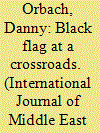|
|
|
Sort Order |
|
|
|
Items / Page
|
|
|
|
|
|
|
| Srl | Item |
| 1 |
ID:
125666


|
|
|
|
|
| Publication |
2013.
|
| Summary/Abstract |
A political trial, according to Steven E. Barkan, is a trial revolving around highly publicized legal controversies. In some cases, such a trial may determine fundamental political questions, exceeding the legal realm, which are in debate inside a given polity. The 1957-58 trial related to the 1956 massacre in Kafr Qasim, Israel certainly belongs to this category. The trial established the doctrine of a "manifestly unlawful order" in Israeli military law, contributed considerably to the reshaping of civil-military relations, and influenced the civic status of the Arab minority in Israel. In this article, using hitherto underexamined primary sources, I argue that the most important contribution of the trial, the doctrine of a "manifestly unlawful order," was not only a creation of the bench but also a result of a complicated interaction between the actors present in the courtroom: the defendants, their defense lawyers, the prosecutors, and the judges. Above all, the article shows how the bitter struggle between the two main attorneys helped shape the doctrine of a "manifestly unlawful order," that is, an order that is illegal for a soldier to obey.
|
|
|
|
|
|
|
|
|
|
|
|
|
|
|
|
| 2 |
ID:
147200


|
|
|
|
|
| Summary/Abstract |
The first generation of radical nationalists in British India played a crucial role in the emergence of political propaganda as a fully fledged industry in the era after the partition of Bengal in 1905. Bal Gangadhar Tilak's 1897 trial is a key moment in this story: it marks the first time that dissent was criminalised, and that reading publics across British India were confronted with powerful arguments theorising political violence. This paper attempts to draw out the meanings Tilak made in two of his texts (an article and a poem, both published in Kesari) and the two most influential readings to which they were subject at the time: one in the courtroom, where the texts were successfully assimilated to the narrowest possible legal interpretation, resulting in Tilak's conviction, and the other in the Indian press, where the drama of the trial eclipsed the texts themselves. The trial moderated the militant message of the texts for the middle-class print public and allowed for a more acceptable definition of radicalism to emerge, one anchored in themes of suffering, sacrifice and victimisation.
|
|
|
|
|
|
|
|
|
|
|
|
|
|
|
|
|
|
|
|
|